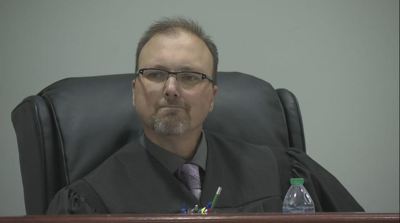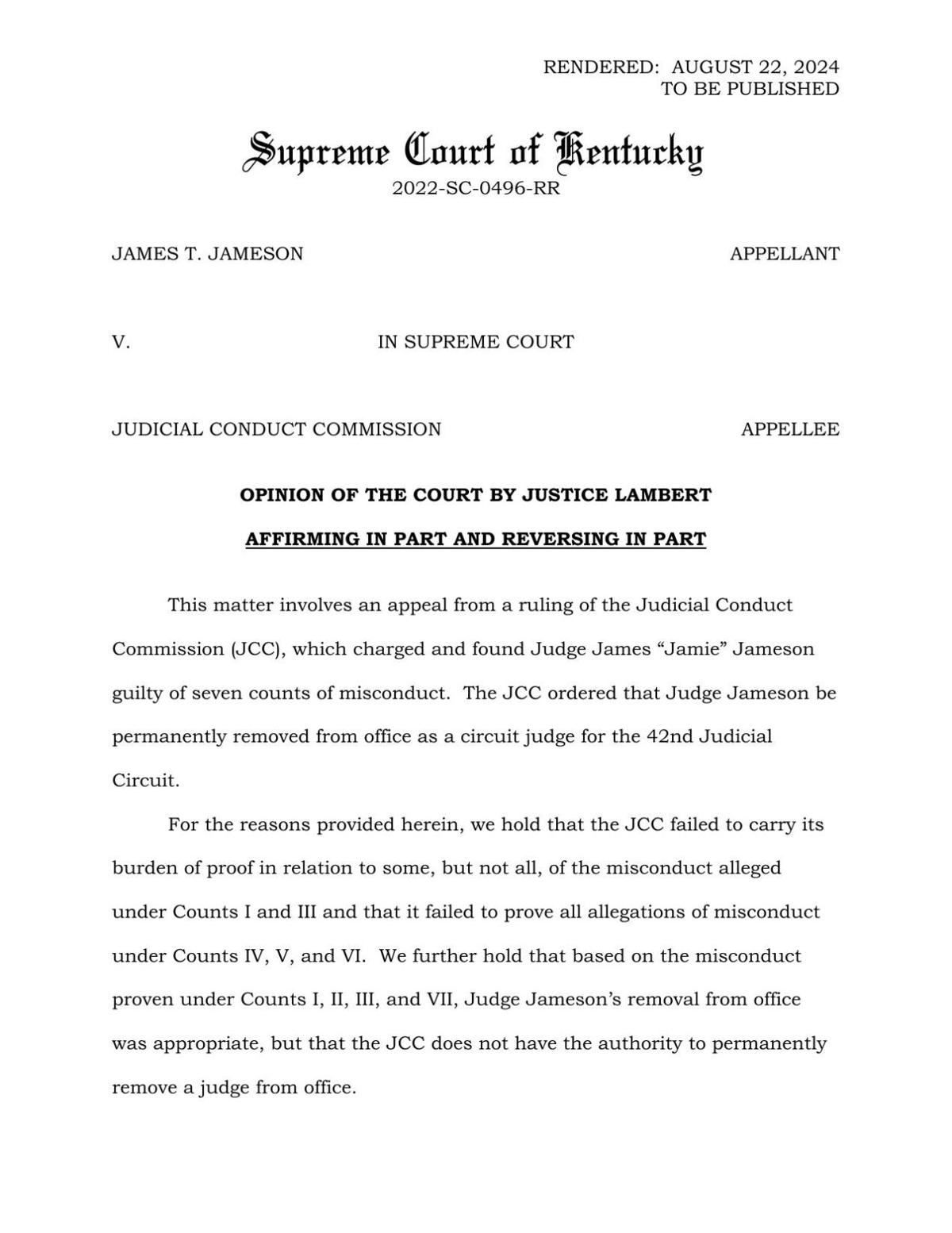MARSHALL COUNTY, Ky. — The Kentucky Supreme Court has both affirmed and also reversed part of the Judicial Conduct Commission's decisions involving Jamie Jameson. The Supreme Court concluded that the JCC did not provide sufficient proof for all the alleged misconduct counts.

In an opinion filed on Wednesday, the Supreme Court found some misconduct was proven (Counts I, II, III, and VII), but other allegations (Counts IV, V, and VI) were not sufficiently proven.
Background
Jameson previously served as the judge of Kentucky's 42nd Judicial Circuit, Division 1.
Jameson's law license was suspended in January 2023 for failing to pay dues to the Kentucky Bar Association. Previously, the Kentucky Judicial Conduct Commission removed Jameson from the bench following an investigation in 2022. Seven counts of misconduct were brought against Jameson in 2022; a hearing followed where Jameson and others testified. The panel found Jameson guilty on all seven counts.
The JCC's ultimate decision was to remove Jameson from the bench in November of that year, calling him "unfit for office." The findings of fact and final order issued by the JCC showed the commission members voted 5-0 on each of the counts, finding that Jameson violated state statutes and the Code of Judicial Conduct.
Jameson provided WPSD-TV a statement on applying for reinstatement for his law license in March of 2024. It read, in part: "Nothing newsworthy there. I just forgot to pay my bar dues in 2022 and chose to start a ministry assisting seniors instead of opening a law office. This sort of thing happens all of the time. In fact, several judges besides me were late paying their dues. If you look at the rules, when anyone misses their bar dues, they can have to go through the same process I am."
The JCC also disqualified Jameson from the 2022 election, but his name remained on the ballot. Andrea Moore defeated Jameson in the race for 42nd Circuit Court judge and currently sits on the bench.
Kentucky Supreme Court opinion
Count IV alleges that "Judge Jameson used his influence and the prestige of his judicial office to pressure persons to donate to or support his political campaign," however, the document observes that Jameson did not make a direct request for a financial campaign contribution, instead asking for "support."
Count V alleges that Jameson "repeatedly attempted to obstruct justice and impede the (JCC's) authority to investigate the charges against him. Specifically, that Judge Jameson intimidated and attempted to interfere with his judicial staff complying with a (JCC) subpoena."
The court states that "there was not clear and convincing evidence that Judge Jameson told his judicial staff not to comply with the JCC's subpoena. Further, the evidence showed that Judge Jameson's primary concern was ensuring that non-responsive, confidential documents in his office not be turned over because they contained documents he had been working on in response to the JCC's charges against him."
The document notes that while it was "wholly improper" for Jameson to contact his staff, "Neither Gipson nor Norman testified that Judge Jameson told them not to comply with the subpoena and, in fact, both stated multiple times that he did not tell them not to comply with the subpoena." As such, the court determined that the JCC failed to prove the allegations in Count V.
Finally, Count VI alleges that Jameson "failed to adhere to the terms of the JCC's temporary suspension order by contacting his judicial staff and availing himself of judicial resources. In addition to contacting two members of his staff, as discussed in Count V, the JCC also alleged that Judge Jameson continued to use his AOC email and computer."
However, the court declared the JCC's temporary suspension order void ab initio as it was not supported by the minimum number of votes that SCR 4.120 requires, rendering Count VI itself moot.
The court concluded that Jameson's removal from office was appropriate based on the proven misconduct in Counts I, II, III, and VII, however, it states that the JCC did not have the authority to permanently remove a judge from office. The court stated, "while the JCC certainly had the authority to remove Judge Jameson for the remainder of his term, this Court has never addressed whether a judge's removal may extend beyond that period either for an indefinite period or permanently."
The 108 page document notes that, regardless, "the evidence demonstrated by clear and convincing evidence that Judge Jameson committed numerous, intentional, and varied acts of misconduct across four counts of misconduct" and agrees that "the removal of Judge Jameson from office was an appropriate sanction."
Jameson's response
Jameson posted a lengthy response to the court's opinion on Facebook.
It read, in part, "The Supreme Court opinion that we have been waiting for quite some time was finally published today. In the majority opinion, it is made clear that I have never broken any law, misused any funds, and, that the things I did to try and bring substance abuse treatment to our community and other benefits were well-intentioned, as there was never any evidence of my doing anything other than trying to do my best to serve the people who put me in office to begin with, the citizens of Marshall & Calloway counties."
It goes on to read, "In a concurring opinion, Justice Thompson said the following about what he called a conspiracy to abuse the judicial complaint process to impact a judicial election, and about other matters that were, in my opinion, not unbiased as they should have been. He says plainly that my record was 'largely exemplary' and 'It is true that Judge Jameson made… missteps in his attempts to serve his community but there is no proof that those mistakes came from anything other than his selfless zeal for the plight of impoverished and drug dependent Kentuckians…'."
The full document can be found below.











